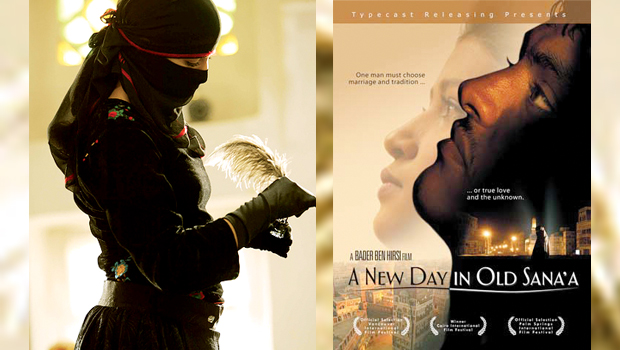The 2005 Yemeni and British movie, which was organized by the British Council, was shown earlier this month to a large audience of 350 people at the Italian Cultural Centre in Jeddah. Directed by Bader Ben Hirsi — a British playwright and director of Yemeni ancestry — it was the seventh movie (out of eight) from the 2010 Jeddah’s fourth European Film Festival.
The movie tells the story of young, rich and eligible bachelor, Tariq, who is about to marry Bilquis, the beautiful daughter of a prominent and powerful judge. As per usual custom, the wedding is arranged by their families and the young couple never met in person. As the village awaits the “wedding of the year,” gossip and envy occupy the lives of the covered up Yemeni women. One night, Tariq wanders the streets of Sana’a and spots a beautiful, uncovered young woman dancing in the streets. She was wearing the dress that he had given as a gift to his future wife. Consequently, he assumes it is Bilquis and falls madly in love with her.
However, when Bilquis denies being there that night and states that the dress is missing, Tariq is left with the daunting decision of protecting his family’s honor by going forward with the arranged marriage or following his heart. Just like Prince charming tries to find who Cinderella is from the missing shoe, Tariq tries to find out who the young woman is from the missing dress.
The movie is narrated by Federico, an Italian tourist and photographer, and the spoken language is in Arabic (except when Federico speaks) with English subtitles. As a foreigner, Federico provides viewers an omniscient point of view that Westerners could identify with, especially when he questions the Arab customs of women having to cover their faces. At the same time, being a photographer, he shows the audience Yemen’s picturesque landscape and lifestyle through his lens.
“A New Day in Old Sana’a” was in fact the first feature length film shot in Yemen. It does a great job in portraying the ancient city in a romantic setting whether it is at night or during the day by giving a view of the city from the rooftops. The movie does a fabulous job in portraying how life is in the conservative country of Yemen, but without all the seriousness one would expect. Its witty dialogue and loveable characters offer a much needed laughter relief for the Western world to see that there is life beyond war in the Middle East. As a result, the storyline is not just entertaining, but educational as well, proving that Middle Eastern people have just as much passion, humor, love and creativity as people in the West.
The film’s success is evident as it won the award for “Best Arabic Film” at the Cairo International Film Festival in 2005 and was the first Yemeni film shown at the Cannes Film Festival a year later.
Marcus Gilbert, Director of the British Council in Western Saudi Arabia, chose this film because he felt the audience in Saudi Arabia would be able to relate to the movie given the countries’ similar traditions. “We want to give people the opportunity to experience foreign films,” he says regarding the purpose of the film festival.
The British Council is the UK’s international organization for educational opportunities and cultural relations and develops relationships with people from a wide range of backgrounds. Its purpose is to build trust and understanding between people in the UK and other countries and to increase appreciation of the UK’s ideas and achievements. Working in 110 countries, it connects people through visits, teaching English, student exchange programs, British exam preparations, library services and many arts and cultural events.
Jeddah’s fourth European Film Festival took place from April 17 to May 5 and was organized by the Honorary Consulate of Spain, the Consulate General of Italy, France, Germany, Switzerland and Turkey, the British Council and the Embassy of Ireland in Riyadh with the support of the European Delegation in Saudi Arabia. All films were screened in their original languages along with English subtitles.
The other seven movies that played were: “Dambe — The Mali Project”, “Los Otros” (The Others), “Auf der andere Seite” (The Edge of Heaven), “Marcello Marcello,” “3 Maymun” (3 Monkeys), “Il Postino” (The Postman) and “Le Couperet” (The Axe).
For more information on the British Council, visit their website at









